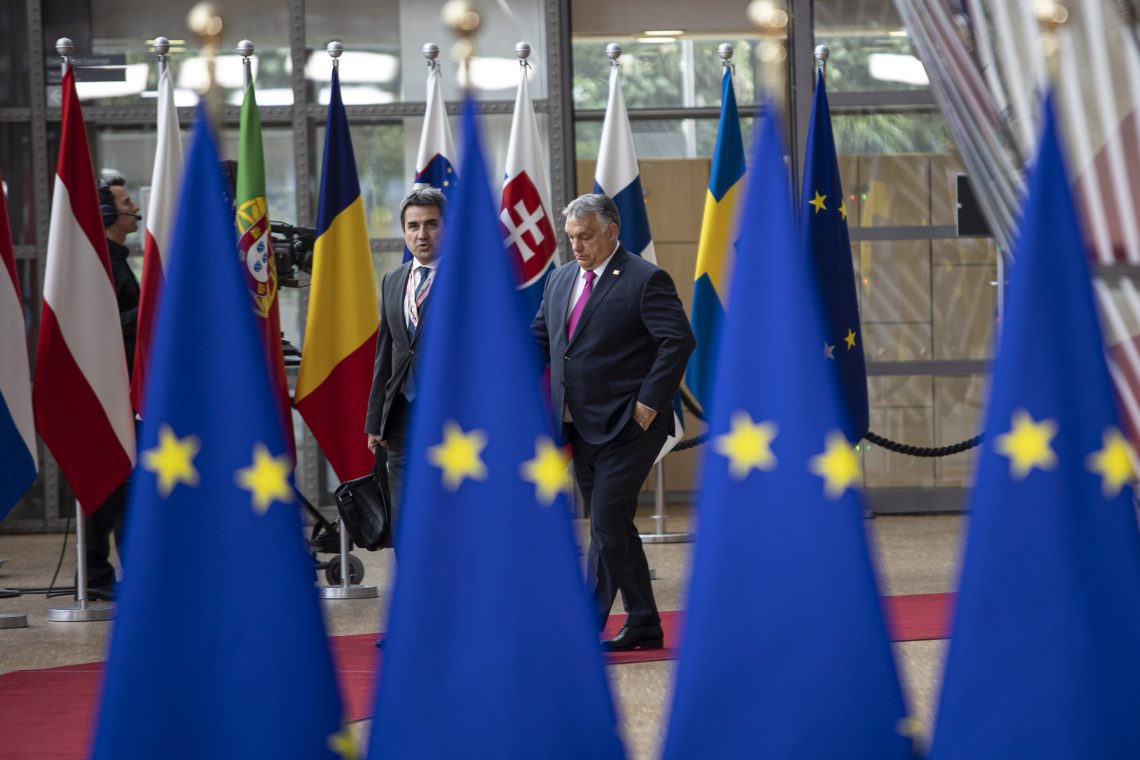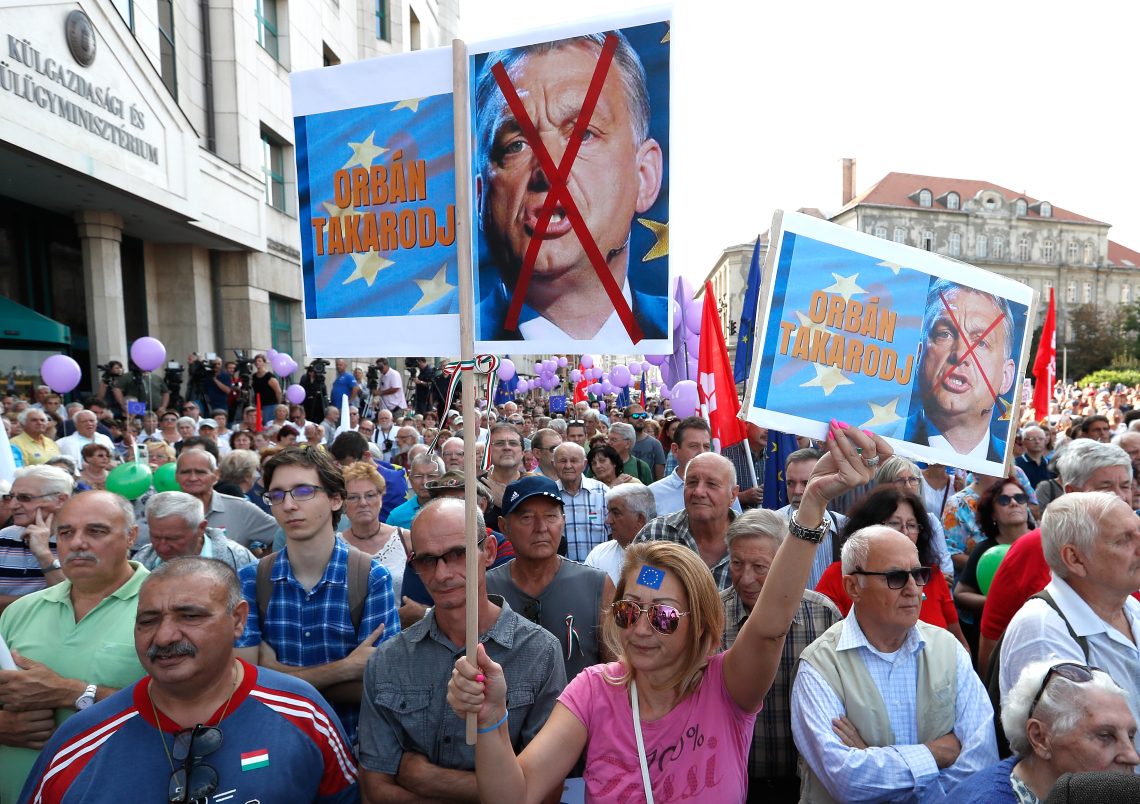Hungary and the EU: A deepening divide
Hungary remains unlikely to leave the EU anytime soon, but pressure from Brussels could rock the Orban government.

In a nutshell
- Hungary remains deeply linked with the EU
- Most Hungarians still favor membership in the union
- But support is declining as sanctions from Brussels intensify
Hungary joined the European Union in 2004. The country remained a net recipient of EU structural assistance from then until 2022, when budget funds were withdrawn by Brussels over rule-of-law issues. In 2021, the country contributed 1.7 billion euros to the EU budget while receiving 6 billion from it. Most of the structural assistance is devoted to “cohesion, resilience and values.” Infrastructure projects were the main areas for spending initially, but over time, ecology, climate protection, energy transition and civil society have played increasingly important parts.
Economically, Hungary is closely intertwined with the EU. Approximately 78 percent of its exports go to EU countries, especially to Germany, at 28 percent. Around 71 percent of imports come from EU member states, with 24 percent from Germany and another 9 percent coming from China. Landlocked Hungary – as a belated consequence of energy trade within the Communist Council of Mutual Economic Assistance (CMEA) – is also highly dependent on Russian gas and oil supplies. However, the volume of these flows has decreased since the beginning of the Ukraine war.
Hungary’s rapprochement with the EU began under the communist regime when the union was still the European Economic Community. As the Hungarian communists’ reformist faction began to lose confidence in the future of socialism, it turned to Western supranational organizations, where it was welcomed. Hungary was described by one West German politician as “the cheerful barracks in the socialist camp,” because, although it was a communist dictatorship, it allowed limited freedom of travel and tolerated mild opposition voices.
As long as a socialist government was in power, there was broad harmony between the EU and Hungary.
In 1989, the year of the collapse of the communist regimes in Central and Eastern Europe, the EEC launched the PHARE program (Poland and Hungary: Assistance for Restructuring their Economies), with the aim of preparing the two countries for integration. Training and technical assistance in areas such as finance, justice and home affairs were intended to create institutions and political systems similar to those in the liberal West. Accession negotiations began in 1998.
In 2003, Hungary held a referendum on EU accession. Although it was a pivotal decision, only a reported 45.6 percent of eligible voters felt it necessary to participate. Many believed that the outcome had already been decided and that no alternative was possible. Of those who went to the ballot, 83.6 percent voted in favor of accession; more than half a million voted against it, despite the EU investing heavily in messaging campaigns promising prosperity, peace and free travel.
There was hardly a love affair between the Hungarian population and the EU, but there were stronger and friendlier ties between the country’s postcommunist technocratic elite and EU technocrats. Accession was a long-held socialist project, with those who promoted it sharing much in common. They were committed internationalists, knew each other personally, had mastered the buzzwords of the day and felt at home in the milieu of supranational organizations. As long as a socialist government was in power, there was broad harmony between the EU and Hungary.
In 2008, when Hungary faced the threat of sovereign default under the socialist government of Ferenc Gyurcsany, the EU came to its aid. To avert bankruptcy, a rescue package of over 25 billion euros was assembled by the EU, the International Monetary Fund and the World Bank. To achieve this, a strict austerity program in social spending was implemented, which severely impacted the already struggling population.
The Fidesz era
The turning point in EU-Hungary relations occurred in 2010 when Viktor Orban’s conservative Fidesz party won elections with a two-thirds majority. Fidesz did not follow the path of some other European right-wing parties, who accepted or even promoted the EU’s pro-globalization agenda.
Prime Minister Orban challenged the project of the “ever closer union” in his election campaign, emphasizing conservative views on the family, national sovereignty and a national Hungarian culture. From then on, he acted according to the principle of “Hungary first.” He soon terminated the rescue agreement with the EU and IMF and began repaying the aid received.

The EU initially believed that Mr. Orban would not dare to follow through with his election promises, which proved to be a significant mistake. The EU’s first serious infringement proceedings against Hungary took place in 2012, over forced personnel changes within the leadership of state institutions. These moves were certainly not in accordance with the rule of law, but from the government’s perspective, they appeared justified because the positions in question had previously been occupied by socialist party supporters. The European Court of Justice (ECJ) ruled against Hungary, not for the last time.
In 2015, the friction intensified when Hungary, along with the rest of the so-called “Visegrad 4” of Poland, the Czech Republic and Slovakia, opposed the resettling of migrants from the Middle East, an effort mainly driven by Germany. Opposing Berlin and Western EU members, Prime Minister Orban argued that individual sovereign states should ultimately decide who resides within its borders.
European Court of Justice
Since then, the European Commission’s numerous referrals to the ECJ against Hungary have not been solely about the specifics of each case. The lawsuits are symbolic for both sides, as they concern the core of Hungarian government policy and national sovereignty. Among other issues, complaints were filed over the obligation for NGOs to disclose their foreign financiers, Hungary’s refusal to accept migrants, and, according to critics, the poor treatment of asylum seekers in designated asylum centers. In 2021, Hungary faced a lawsuit for banning the portrayal to minors of homosexuality or sex reassignment, which the Commission argued violated LGBT rights.
Beyond any particular disputes, Budapest makes a more fundamental criticism of the ECJ’s decisions: that the EU uses the court as an instrument to amend the original EU treaties, thereby creating new standards to which no country has explicitly agreed. This charge was especially prominent in a case of the so-called “rule-of-law mechanism” in 2022, when the ECJ said that the Commission could withhold funds to sanction states deemed not to be upholding the rule of law.
To have a more effective instrument against the conservative governments of Hungary and Poland, in 2020 the European Council adopted the “conditionality mechanism.” The disbursement of funds would henceforth be linked to the rule of law in the respective country.
Read more on Hungary
Hungary on its own path
What the rule of law consists of, and whether it is implemented in a country, is effectively determined by the EU leadership, the ECJ, and more recently, the European Parliament; no such definition is included in the EU treaties. An ECJ judgment of February 16, 2022, asserted that the rule of law principles “have their source in common values which are also recognized and applied by the member states.” Yet it is precisely these values about which the Hungarian government dissents. As Viktor Orban has cast it: “For them, the rule of law is an instrument with which they want to shape us in their image.”
Since then, no funds have been paid to Hungary. From the EU financial framework for 2021-2027, Hungary would be entitled to about 49 billion euros, including the money from the previous budget cycle. Hungary’s stance on the Ukraine war, more neutral than other EU members, has also contributed to the intensifying row with Brussels.
Scenarios
How long can Hungary remain a member of the EU under these circumstances? In a recent interview, Mr. Orban claimed that the EU would no longer fulfill either of its two promises: prosperity and peace. On key issues such as migration, gender and national independence, the government will hold to its positions as long as Fidesz is in government. And it is likely to remain in power; according to the latest polls, the prime minister’s party now has a three-quarters majority.
What is the way out? Mr. Orban repeatedly emphasizes that Hungary wants to stay in the EU. Any other option would be tantamount to economic suicide for the small landlocked country, which is deeply intertwined with the EU.
“The most important question is whether we want to stay together – especially here in Europe, because the European Union only has a future if we can stay together in spite of our growing cultural estrangement,” Mr. Orban argued in a 2022 speech. “We do not expect them to adopt and elevate to [the] European level Hungary’s migrant policy, our family policy or our policy on foreign affairs and Hungarian minorities beyond our borders. Yet at the same time they cannot demand that we adopt their policies either. There is no other solution but tolerance.”
The aim of the EU’s funding cuts is system change in Hungary. Additionally, the EU finances Hungarian NGOs that are critical of the government, which the government believes constitutes indirect support for the opposition parties. The leading opposition party, the Democratic Coalition, has advocated for the further development of the EU into a “United States of Europe.” This idea has found favor in Brussels, where the Commission and Parliament routinely welcome Hungarian activists and opposition members to deliver their charges against the Fidesz government. Meanwhile, the United States has been exerting pressure on the EU leadership for some time, and since the Ukraine war has urged even tougher action against Budapest.
The Hungarian population backs EU membership, with more than 60 percent still in favor of remaining. However, support is declining, mainly because of the impact of Western sanctions against Russia and the absence of EU payments. If the continued cancelation of EU funds proves untenable, Hungary’s voting rights could potentially be withdrawn. Many in Hungary fear that this will push the country into a situation where the government has no choice but to leave the Union, which would likely lead to its ouster and possibly an uprising.









